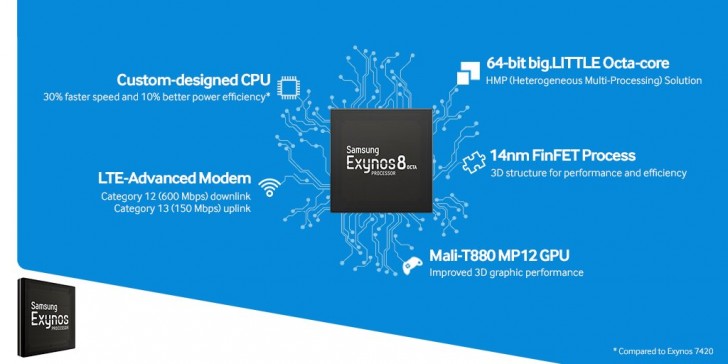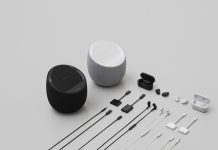
Samsung has announced the next, newest member of its Exynos family of mobile chipsets in South Korea overnight, officially unveiling the Exynos 8 Octa 8890. This processor is the second evolution of application processor built on Samsung’s renowned 14nm FinFET process technology, and while that sounds like industry speak, the rub is that the Exynos 8 Octa is a single chip incorporating Samsung’s first custom-designed 64-bit ARMv8 CPU integrated with an LTE Cat12/13 modem.
This is all technobabble for this processor being a real powerhouse, capable of powering 2016’s devices, and maybe even 2017’s as well (though Moore’s law would suggest otherwise). Compared to the previous Exynos 7 Octa, the new processor is capable of 30% increased performance and 10% more power efficiency, a critical improvement.
Samsung has big things in mind for the Exynos 8 Octa, as you’d expect from a company with a significant stake in the mobile marketplace. Samsung’s Vice President of System LSI Marketing, Kyishik Hong, had this to say:
“The Exynos 8 Octa is a leading-edge application processor for next-generation mobile devices that incorporates Samsung’s mobile technology leadership in CPU, ISP, and modem as well as process technology. With our custom designed CPU cores and the industry’s most advanced LTE modem, consumers using mobile devices with the Exynos 8 Octa will experience a new level of mobile computing.”
As the ‘Octa’ part of the name implies, there are eight cores in the Exynos 8 Octa, including for ARM Cortex-A53 cores and four of Samsung’s custom cores. The LTE part of the chipset is equally impressive; the inclusion of a Cat.12/13 modem enables maximum download speed of up to 600Mbps (Cat.12) and upload speed of up to 150Mbps (Cat.13) with carrier aggregation.
The graphics processing side of things isn’t forgotten either, with the inclusion of ARM’s latest GPU, the Mali T880 with improved 3D graphic performance for gaming.




Coincidence that Samsung announced it a couple of days after the Snapdragon 820 was announced? I wonder how they compare. If Samsung is keeping this processor to itself for the S7, I wonder what the point of marketing it is…just to promote the S7, which is rumoured to be released earlier this time around?